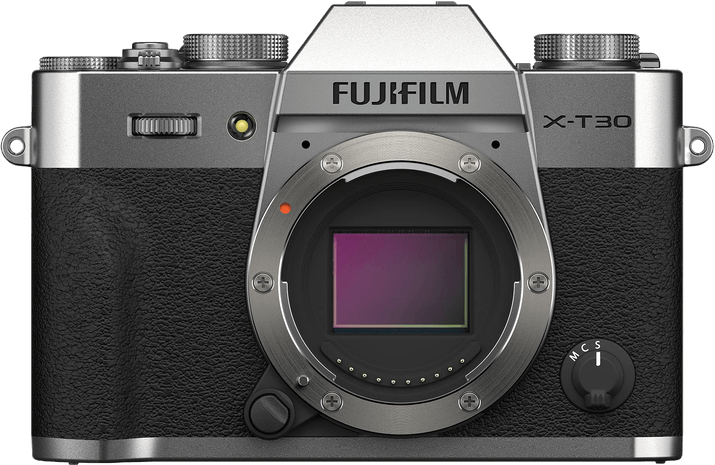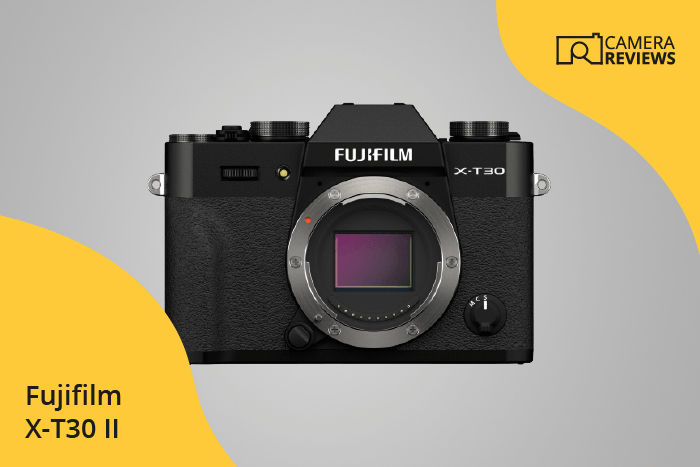Fujifilm X-T30 II Specs and Scores

The Fujifilm X-T30 II receives a score of 65/100 for its general specifications. Announced on September 2, 2021, this mirrorless camera is a 2021 release with a launch price of $899. It has a size of 118 x 83 x 47mm and a weight of 383g (0.84lbs).
These specifications position the X-T30 II as a competitive option in today’s market. Its compact size and lightweight design make it an attractive choice for photographers seeking a portable and user-friendly camera. While the score of 65/100 may not make it the top choice for all, it still offers solid features for its price range.
Fujifilm X-T30 II Overview and Optics
The optics of the Fujifilm X-T30 II receive a score of 67/100. This camera has 26 megapixels, a shooting speed of 30, and a CMOS sensor. Its X-Processor 4 ensures fast processing, while the APS-C sensor size contributes to high-quality images. The Fujifilm X lens mount allows for a wide range of compatible lenses.
Although the DXOMARK score for the sensor is not available, the camera’s specifications remain competitive in today’s market. However, it lacks image stabilization, which could be a drawback for some users. The 3:2 aspect ratio is standard for digital cameras and suits a variety of photography styles.
The Fujifilm X-T30 II offers decent optics performance, but improvements in image stabilization could enhance its appeal. Despite this limitation, the camera’s other features make it a strong contender in the market.
Fujifilm X-T30 II Video Performance
The Fujifilm X-T30 II earns a video score of 91/100, showcasing its impressive capabilities in this department. This camera boasts a maximum video resolution of 4K, with dimensions reaching 4096 x 2160. Additionally, it can record at a high frame rate of 120fps, ensuring smooth and detailed footage.
These specifications place the X-T30 II among the top contenders in today’s market, especially for those seeking high-quality video recording. Furthermore, the built-in time-lapse functionality adds to the camera’s versatility, making it suitable for various creative projects.
The Fujifilm X-T30 II’s high video score reflects its strong performance and features. Its video capabilities make it a reliable choice for both casual users and professionals seeking a powerful yet accessible camera.
Fujifilm X-T30 II Features and Benefits
The Fujifilm X-T30 II receives a feature score of 70/100. This camera comes with a 3-inch screen, offering ample viewing space for users. The screen resolution is 1,040,000 dots, ensuring clear and sharp images. The camera includes a touchscreen and flip screen, enhancing usability and convenience for various shooting situations.
Despite lacking GPS, the X-T30 II compensates with WIFI and Bluetooth connectivity. These features facilitate easy file transfer and remote camera control. In the current market, the Fujifilm X-T30 II offers a competitive set of features, making it a reliable choice for photographers.
Considering its specifications, the Fujifilm X-T30 II stands as a strong contender among its peers. The combination of advanced features and connectivity options make it a versatile camera for various photography needs.
Fujifilm X-T30 II Storage and Battery
The Fujifilm X-T30 II’s storage and battery performance receives a score of 35 out of 100. This camera has a single memory card slot, accepting SD, SDHC, and SDXC cards with UHS-I compatibility. In today’s competitive market, having only one memory card slot may be a disadvantage for some users who prefer multiple slots for backup and flexibility.
Regarding battery life, the X-T30 II is equipped with an NP-W126S battery, allowing for 380 shots per charge. This battery life is average among its competitors but could be improved to meet the demands of professional photographers. The camera does offer USB charging, providing convenience and versatility for on-the-go users.
Taking the storage and battery capabilities into account, the Fujifilm X-T30 II may not be the top choice for those prioritizing these features. However, it still offers a reasonable performance that can cater to the needs of various photography enthusiasts.
Fujifilm X-T30 II Alternatives
Do you want to know how the Fujifilm X-T30 II compares to its competitors? Have a look at the most popular comparisons for this camera below:
- Fujifilm X-T30 vs X-T30 II
- Fujifilm X-S10 vs X-T30 II
- Fujifilm X-T30 II vs X100V
- Fujifilm X-E4 vs X-T30 II
- Fujifilm X-T30 II vs X-T5
- Fujifilm X-T30 II vs Sony a6400
Fujifilm X-T30 II FAQ
Does the Fujifilm X-T30 II Have Built-in Image Stabilization?
Unfortunately, the Fujifilm X-T30 II does not have built-in image stabilization. However, it supports lenses with optical image stabilization to help reduce camera shake.
Does the Fujifilm X-T30 II Support 4K Video Recording?
Yes, the Fujifilm X-T30 II supports 4K video recording at 30 frames per second, allowing you to capture high-quality, cinematic footage.
What Size Sensor Does The Fujifilm X-T30 II Have?
The Fujifilm X-T30 II features an APS-C sized sensor, which is a popular choice for many mirrorless cameras due to its balance between size, image quality, and low-light performance.
Does the Fujifilm X-T30 II Have a Dual Memory Card Slot?
No, the Fujifilm X-T30 II has only a single memory card slot, which supports UHS-I SD cards for storing your photos and videos.
Does the Fujifilm X-T30 II Have a Touch Screen?
Yes, the Fujifilm X-T30 II has a touch screen, which allows you to easily navigate menus and make adjustments to your settings with a tap or swipe.
Does the Fujifilm X-T30 II Have Wi-Fi and Bluetooth?
Yes, the Fujifilm X-T30 II has both Wi-Fi and Bluetooth connectivity, enabling you to transfer images and remotely control the camera using a compatible smartphone or tablet.
Does the Fujifilm X-T30 II Have GPS?
No, the Fujifilm X-T30 II does not have built-in GPS. However, you can still geotag your photos using the GPS data from a connected smartphone or tablet.
Is the Fujifilm X-T30 II Weather Sealed?
No, the Fujifilm X-T30 II is not weather sealed. To protect your camera from the elements, consider using a rain cover or investing in a weather-resistant lens and camera body.
Does the Fujifilm X-T30 II Have a Built-in Flash?
Yes, the Fujifilm X-T30 II has a built-in flash, which can be useful for adding a little extra light in low-light situations or for fill flash in harsh lighting conditions.

